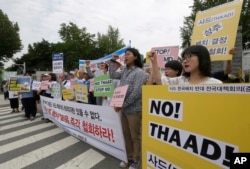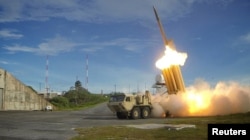Hundreds of South Koreans who live near the future deployment site of the U.S. THAAD missile defense system staged a protest in Seoul Wednesday.
Gimcheon Mayor Park Bo-saeng told the protesters that he has tried to dissuade provincial leaders and defense ministry officials from deploying the Terminal High Altitude Area Defense (THAAD) system near his city of 13,000 people, but his pleas fell on deaf ears.
“They told me they will help us when I met them. But who is helping us?” asked Mayor Park.
Protests over the summer forced the South Korean government to move the planned THAAD location away from one area in Seongju County that was 1.5 kilometers from a population center.
The new site, selected in September, is the Lotte Skyhill Country Club golf course, which is in a more rural part of Seongju County, and eight kilometers away from the city of Gimcheon, in the southern end of the Korean Peninsula.
Smaller protest
The number of protesters who came to the South Korean capital for the anti-THAAD demonstration on Wednesday was significantly less than the estimated 5,000 that came for the last major rally in July.
Many are angry that the deployment decision was made suddenly without local input.
“I may welcome it if [the South Korean government] deploys THAAD with certain measures and alternative plans. But there was no briefing session for residents and Gimcheon citizens are treated as invisible men,” said Gimcheon resident Choo Moon-ho.
Radiation fears
Many local residents are concerned that exposure to the electromagnetic radiation from the system’s radar could cause serious harm to nearby residents and could contaminate agricultural products.
THAAD uses high-resolution radar designed to detect and track ballistic missile threats at long distances and high altitudes. The system’s radar and infrared seeking technology are used to program six mobile launchers and 48 interceptor missiles.
South Korean and U.S. militaries have tried to refute these health concerns by publicly conducting a test of the THAAD system in Guam showing that outside a 100-meter radius safety zone, there is no danger of radiation exposure.
Some residents say they have done their own research that contradicts the government’s findings.
“The factory which manufactures THAAD said it is harmful and people cannot live in the area within 3.6 km of the deployment. The defense ministry does not recognize the fact,” said Kim Kyung-soo who lives less than two kilometers from the THAAD site.
Existential threat
South Korean President Park Geun-Hye said the deployment is needed to defend against the existential threat posed by North Korea’s advancing nuclear and ballistic missile capabilities.
Pyongyang has threatened a "physical response" against the THAAD deployment, which has raised concerns among some Gimcheon residents that their region could be targeted by a North Korean attack.
“I don't want anyone in South Korea to get hurt and even if THAAD is deployed, North Korea may attack South Korea,” said a woman who gave only her last name Seo.
China opposes
China has also voiced its strong opposition to the THAAD deployment in South Korea and urged Seoul and Washington to put a stop to it.
Beijing’s Foreign Ministry said the missile defense system deployment is not beneficial to maintaining peace and stability on the Korean peninsula and will seriously harm the security of countries in the region, including China.
Beijing has raised concerns the THAAD radar system would be used to penetrate Chinese territory.
There have also been reports in regional media that China might impose economic and trade restrictions on South Korea. But officials in Seoul have downplayed the possibility that Beijing would retaliate over THAAD.
Youmi Kim in Seoul contributed to this report.


